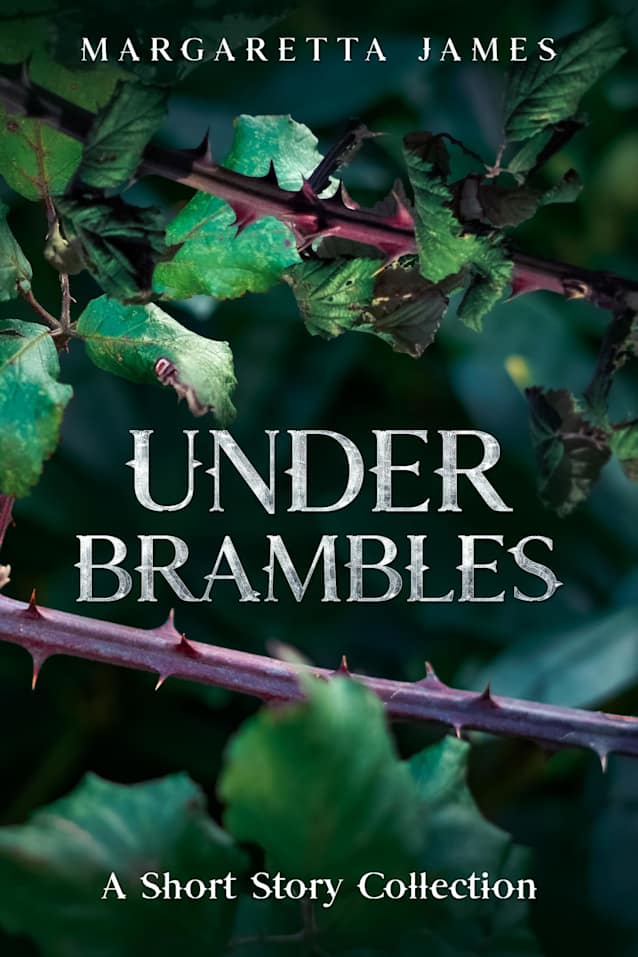Under Brambles: A Short Story Collection
About
Literary short stories that seek to find beauty in the cracks of people’s lives. Elvis at the Casino On New Year’s Eve. A divorced mother who goes to teach in China. A one night stand that ends with the death of Nina Simone. For those who appreciate that short stories capture moments, not lifetimes.
Praise for this book
⭐⭐⭐⭐⭐
The review recommends UNDER BRAMBLES: A Short Story Collection by Margaretta James for its thought-provoking exploration of memory, loss, and resilience through poetic and emotionally immersive stories. The book is highly recommended for literary fiction enthusiasts, young adults, and older readers who have undergone personal transformations and emotional hardship. The reviewer notes that the stories provide deep satisfaction and a lasting impact.
⭐⭐⭐⭐⭐
Reading Under Brambles: A Short Story Collection was an experience that’s hard to put into words. The emotions and depth of Margaretta James' stories touch the heart directly. Each story offers a glimpse into a unique world of its own.When I began reading, I expected a simple collection of short stories. However, as I turned the pages, I found myself completely drawn in. The book opens with There Be Dragons, a story set on a beach featuring a stunning sand dragon sculpture. The vivid narration made me feel like I was part of the crowd, marveling at the dragon's magnificence under the night sky. The portrayal of human instincts at the story’s conclusion left me reflecting deeply.
My Mother Who Danced was the most touching story for me. It beautifully explores the complex relationship of love and resentment between a daughter and her mother. The narrative delicately balances the mother’s strictness with the weight of her tragedy. It made me think about my mother and her sacrifices.
Elvis in Paradise is a remarkable blend of humor and tragedy. The story centers on a man who resembles Elvis Presley and gains mysterious attention in a casino. Margaretta’s storytelling is so vivid that I felt as though I were in that casino, observing every move of this enigmatic Elvis figure.
The Doll stands out for its exploration of the darker aspects of an otherwise simple life. Athena, the protagonist, struggles with loneliness, and the story is written with great sensitivity. It makes you reflect on how even the smallest decisions in life can have profound effects.
Under Brambles, the title story of this collection delves deeply into human emotions and the evolving aspects of society. This story symbolically portrays societal changes, collective emotions, and cultural degradation over time.
Each story in this collection is exceptional in its own way. Margaretta’s writing shines through her ability to craft powerful stories using subtle, everyday details. Her characters feel incredibly real, and their emotions and circumstances resonate deeply with the reader.
Overall, this book is perfect for those who enjoy short yet meaningful stories. Every page felt like it became a part of my life. If you love delving into humanity, emotions, and the complexities of life, Under Brambles is a must-read.
⭐⭐⭐⭐⭐
Under Brambles is a tapestry of vignettes, poems, and narratives that unravel the raw beauty found in the broken, the forgotten, and the misunderstood. Margaretta James takes us through fragments of lives—of people on the margins, of unspoken pain, of longing, and fleeting moments of connection. The stories don’t follow a linear structure; instead, they pull the reader through waves of emotion, leaving behind echoes of regret, defiance, and tenderness.James’s writing is poetic and immersive, painting scenes with words that feel almost cinematic. The opening piece, There Be Dragons, transports us to a bustling night market, where a sand-sculpted dragon silently witnesses human cruelty and kindness. The sensory details—jasmine, salt air, the flickering light of candles—make the setting almost tangible. But beyond the lush descriptions, the story carries an undercurrent of sorrow, of destruction, of the transient nature of beauty. The dragon, lovingly crafted and then desecrated, becomes a metaphor for the fragility of creation in the face of careless violence.
One of the most gut-wrenching entries, My Mother Who Danced, is written as a letter from a daughter to a mother she spent her whole life resisting, only to understand too late. The honesty in this piece is brutal. The resentment, the love, the guilt—it’s all there, tangled up in a raw confession that is both personal and relatable. The narrator’s realization that she has inherited some of her mother’s traits and that she has failed to appreciate her mother’s sacrifices hits hard. This isn’t just a story about a complicated mother-daughter relationship; it’s about the passage of time, about regret, about how we often only recognize love in hindsight.
Then there’s Hallelujah, a darkly satirical take on faith, miracles, and commercialism. A statue of the Madonna in a failing church begins bleeding, and the reaction is swift. What starts as a seemingly divine event is quickly swallowed by human greed, morphing into a spectacle that loses all meaning. James expertly balances humor and cynicism here, crafting a sharp critique of the way society exploits faith for gain.
The book doesn’t shy away from pain. In Story from a Quilt, James presents a heartbreaking tribute to a friend lost to illness and societal rejection. The imagery of a memorial quilt, each patch a piece of a life cut short, is devastatingly beautiful. The contrast between the vibrant, rebellious life of the protagonist and the cold indifference of the institutions that shunned him makes for an emotional gut-punch. The writing here is particularly poignant, moving between nostalgia and grief in a way that feels personal.
Under Brambles is not for readers looking for a conventional story with clear resolutions. It’s for those who appreciate writing that makes them feel something raw and unfiltered. This book is for lovers of poetic prose, for those who find beauty in imperfection, for anyone who has ever looked back and wished they had understood sooner.
⭐⭐⭐⭐⭐
In Under Brambles, a short story collection by Margaretta James, the author presents eighteen stories about broken people through poetry and prose. Some narratives include a beautiful letter from a daughter to her mother, how an individual in the prime of life can wink out of existence in a moment, the world from the point of view of a very young child, the lessons learned best from a lover, and the way an almost forgotten starlet humbly accepts the trajectory of her career. The author depicts lifelong relationships and momentary associations, producing stories that may be digested over a cup of tea or a short subway ride. James communicates meaning in every piece, giving readers thought-provoking selections.Margaretta James crafts a complex story from a single thought. I cried as I read the story a woman had unearthed about her Irish mother. Many of the stories seem like they truly happened to the author as she describes them in such descriptive detail. The raw descriptions place you in the moment, running with a lost friend, playing the piano as a man undresses you, or feeling like you're an orphan mid-way through your life. Each story leaves a melancholy trace that makes you remember the narrator of each tale vividly and continues to resonate with you throughout the day. No connections flourish into marriages or cherished experiences that endure beyond memories, but you still chase the ending of the story and welcome the feelings expressed in each piece with open arms. Readers who enjoy realistic fiction will love Under Brambles.
A dragon moulded from sand bears witness to the display before its fiery soulful eyes. A homeless man turned messiah taps into the bleeding heart of a Madonna from which a miracle was packaged and sold to the masses. Poetic Mandarin spills from the mouth of a lover in the throes of passion, only to vanish with him without a trace.
We find ourselves in Shanghai, in different corners of Australia, tucked away into a rural Irish town, on the beach and in the cityscape, in memories of love painfully lost, brushed shoulders with impassioned revolutionaries, gilded in empty withering glamour, learning what to do with the grief born from loss or indifference, wrapped in all the complexities of the human experience in this delightful tapestry of poetry and prose.
Spoiler-Free Plot
This book presents readers with a buffet of themes to gorge themselves on. Eighteen distinct pieces carry you from childhood through to old age with pit stops at various points in between. Each time experiencing a broad range of emotions laid bare in profoundly personal vignettes.Readers are treated to glimpses of both the mundanity and the complexities of life. The monumental events and the casual comforts. Displays of human nature, sometimes oscillating between opposing viewpoints, only visible for long enough to internalise their essence without giving too much away; eliminating the potential to turn stale maintains their evergreen condition.
Some of the poetry requires a quiet moment to glean its deeper meaning, some is more transparent, all of it is unapologetically candid. Expect to find satisfaction with ambiguous endings that leave you feeling content despite their lack of defined finality.
My Take on Under Brambles
If most stories in this collection are fiction and the remainder drawn from the tumult of real life experiences, you cannot tell one from the other. No matter the familiarity we may have with one story over the rest in relation to the finer details, there is still an immense sense of kinship, or rather a close affinity with each character and their highlighted situations, because of how expressively they are written.Because we have all felt frustration, shame, despair, misplaced hope, grief, optimism that rejects insurmountable odds, the intimacy derived from living in close quarters with another, all of these universal sentiments, we are able to connect with characters who would be complete strangers otherwise in our collective participation in the emotional aspects of the human condition.
The stories feel plausible. Tied to reality by their authenticity. Even some of the more unconventional ones.
My favourite example that fits this theory would be “I Think it’s Going to Rain”. I can imagine someone, perhaps in Brisbane or some far flung city thousands of miles away from the location that inspired the story, slack-jawed as they rip through the thirteen odd pages dedicated to Nina Simone and her devotees. An eerie feeling sinking in as they recall a similar chapter in their own lives. Maybe with a different musician, a different instrument, different weather. The panic of having unwittingly caused the death of a celebrity or any other person they view with such reverence.
Same with the title “Three”. Likely viewed as a distant memory by an adult who was once the child in their own version of the tale. The external pressures of their past situation offered up by their mother piece by piece over a cup of afternoon tea. All things they were once oblivious to when compared to the importance of trains, dinosaurs, barbie dolls or cartoons. Providing them a retrospective point of view of an era in their lives. A handful of others inspire the same realism.
Having mentioned this element prior, I would like to expand on it a little more. In most short story collections I have read in my time, humour is largely nonexistent. The heavy weight of the subject matter turns what should be a quick, pleasant pastime into something one must wade through with difficulty.
I genuinely laughed and smiled at parts of Ralph the Messiah, Elvis in Paradise, Fluency, and others. Instead of feeling unsettled, or a tad unbalanced at the end of the collection, I felt as though I had found an equilibrium, having struck a balance in the acceptance of the highs and lows of life portrayed between the pages.
Margaretta James has a magical way with words. If there was ever a need for a visual representation to express the richness of her work, it would come in the form of a type of alchemy. Her words would be the substrate, the intensity of the affections they invoke becomes the fuel. Margaretta would already be considered a master of the craft, and far wealthier than anyone could imagine, which still holds true for her literary achievement.
Age Rating
16 years and aboveContent Warnings
Dementia, Profanity, Religious Themes, Sexual Content, Sexual Violence.



